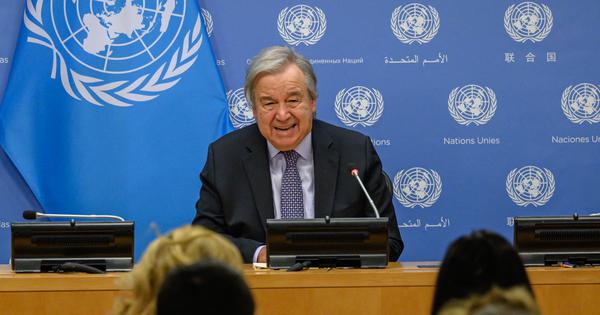
United Nations Secretary-General Antonio Guterres on Tuesday said that humanity has failed to limit global heating to 1.5 degrees Celsius and warned that it must change course immediately, The Guardian reported.
In an interview to the British newspaper and Amazon-based news outlet Sumaúma ahead of next month’s COP30 conference, Guterres said that it is now “inevitable” that humanity will overshoot the target set in the 2015 Paris Agreement, which will have “devastating consequences” for the world.
Under the 2015 agreement, countries had agreed to keep the long-term global average surface temperature well below 2 degrees Celsius above pre-industrial levels and pursue efforts to limit it to 1.5 degrees Celsius by the end of the 21st century.
A warming of more than 1.5 degrees Celsius can lead to severe climate change impacts and extreme weather. Pre-industrial levels refer to global atmospheric conditions before the widespread impact of industrialisation, which included burning coal, oil and gas and other such activities.
COP30, or the 30th Conference of the Parties to the United Nations Framework Convention on Climate Change, will take place from November 10 to November 21 in Brazil’s Belém.
On Tuesday, the UN secretary-general urged leaders attending the COP30 to realise that the longer they delay cutting emissions, the greater the danger of passing catastrophic “tipping points” in the Amazon, the Arctic and the oceans, The Guardian reported.
The Intergovernmental Panel on Climate Change defines tipping points as “critical thresholds in a system that, when exceeded, can lead to a significant change in the state of the system, often with an understanding that the change is irreversible”.
“Let’s recognise our failure,” the newspaper quoted Guterres as saying. “The truth is that we have failed to avoid an overshooting above 1.5 degrees Celsius in the next few years. And that going above 1.5 degrees Celsius has devastating consequences.”
The priority at COP30 was to shift direction, the UN secretary-general said, adding that it was “absolutely indispensable to change course in order to make sure that the overshoot is as short as possible and as low in intensity as possible to avoid tipping points like the Amazon”.
He added: “We don’t want to see the Amazon as a savannah. But that is a real risk if we don’t change course and if we don’t make a dramatic decrease of emissions as soon as possible.”
The UN secretary-general also said that government commitments have proved inadequate despite growing scientific alarm at the speed of global temperature increases caused by the burning of fossil fuels – oil, coal and gas.
Only 62 out of 197 countries have sent in their Nationally Determined Contributions under the 2015 Paris Agreement, The Guardian reported. These Nationally Determined Contributions, or NDCs, are national climate action plans by each country under the agreement.
The lack of NDC ambition means the Paris goal of 1.5 degrees Celsius will be breached, at least temporarily, Guterres said.
“From those [NDCs] received until now, there is an expectation of a reduction of emissions of 10%,” the newspaper quoted him as saying. “We would need 60% [to stay within 1.5 degrees Celsius]. So overshooting is now inevitable.”
However, it might still be possible to temporarily overshoot and then bring temperatures down in time to return to 1.5 degrees Celsius by the end of the century, the UN secretary-general said, adding that this would require a change of direction at and beyond COP30.
He urged governments to rebalance representation at the conference so that civil society groups, especially from indigenous communities, will have a greater presence and influence than participants paid for by corporations.
In January, scientists at Europe’s Copernicus Climate Change Service said that the year 2024 was the first in which the average global temperature exceeded 1.5 degrees Celsius above pre-industrial levels.
The Copernicus Climate Change Service is one of six thematic information services provided by the Copernicus Earth Observation Programme of the European Union. It collates data on the climate in Europe and the rest of the world.
The climate change service said that 2024 was also the warmest year since 1850 on record globally. It added that the global average temperature last year stood at 15.10 degrees Celsius, overtaking that of 2023 by 0.12 degrees Celsius.
The past 10 years were the 10 warmest on record, it said, adding that a new record high for daily global average temperature of 17.16 degrees Celsius was reached on July 22, 2024.
Also read:
📰 Crime Today News is proudly sponsored by DRYFRUIT & CO – A Brand by eFabby Global LLC
Design & Developed by Yes Mom Hosting






